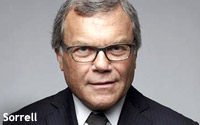 Departing from the stand his company has taken on the issue, WPP CEO Sir Martin Sorrell said Friday that the current C3 ratings system would have to be
revised.
Departing from the stand his company has taken on the issue, WPP CEO Sir Martin Sorrell said Friday that the current C3 ratings system would have to be
revised.
Sorrell said it was his personal view -- he stressed that it was not the company’s -- that the networks have a “strong argument” for extending the current C3
ratings metric to a measurement that captures more days of on-demand viewing. While noting that GroupM executives believe that C3 is “sufficient for now,” Sorrell said that as viewing
patterns continue to change, “the system needs to change.”
He made his comments at a breakfast presented by the Paley Media Council in New York, where he was interviewed by
Thomson Reuters’ Chrystia Freeland.
Sorrell also said that in the media and marketing world, legacy companies like the TV networks, and ad firms like WPP, must be flexible and
experiment in order to remain current and properly serve audiences and clients.
The $70 billion that is spent on TV ads each year is “about right” given the amount of time that
audiences spend with the medium. That said, he stressed that the networks “have to be much more flexible,” given shifting viewing patterns as smaller screens begin to grow in
popularity.
Recent Nielsen data in the U.S. “is not pretty” -- especially among younger age groups, who are watching in bigger numbers on the Internet, tablets and smartphones,
Sorrell said.
And holding companies that don’t experiment risk disintermediation, he added. That’s why the company has invested in firms like Media Rights Capital, the
production studio behind the Netflix original series "House of Cards."
“We need to be a strategic VC,” said Sorrell, noting company investments in firms including The Weinstein
Co., Buddy Media and Vice.
Still, with media giants like Google, Amazon and Apple dominating the digital landscape, disintermediation remains a risk. Sorrell pointed to Google as Exhibit
No. 1. Recently, the company’s sales force contacted a WPP client. “They wanted to deal directly with them and disintermediate us,” he said, despite the estimated $2.5 billion that
WPP will spend with Google this year.
“Life is full of frenemies,” Sorrell said. ‘We have to work together.” For WPP, doing business today is “very difficult.
It’s like being in the trenches. It’s a slow growth world with not enough demand.”
This year, the holding company will produce record financial results, Sorrell
said. But like 2012, “we’ll get there ugly,” and with help from acquisitions, a sharp eye on costs and “a currency tailwind.” Ultimately, that’s a “reflection
of what our clients are seeing,” he added.
Clients are increasingly focused on finance and procurement issues. He cited the recent case of a client requesting that WPP extend the time
that payment was due for services from 30 days to 120 days. “We said no, but it’s a big issue.”
The company also faces pressure from the investor sector “not to do
anything” that would jeopardize what little growth is available. “The focus is on buy-backs and dividends," he said. From that perspective, he added, “the private-equity sector is
more attractive.”
advertisement
advertisement